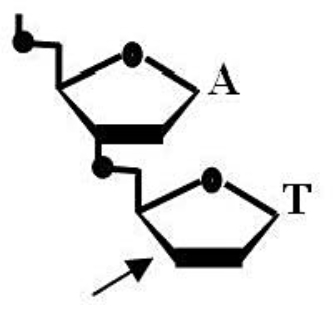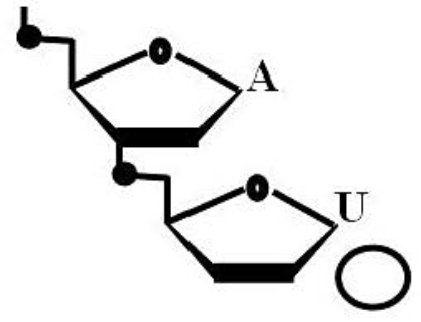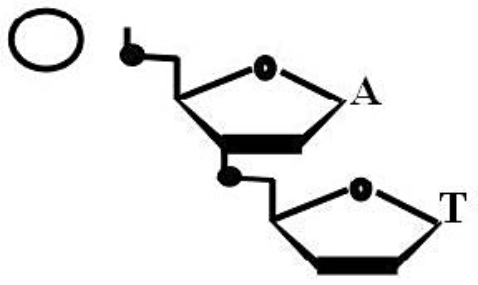Deck 9: DNA Structure and Analysis
Question
Question
Question
Question
Question
Question
Question
Question
Question
Question
Question
Question
Question
Question
Question
Question
Question
Question
Question
Question
Question
Question
Question
Question
Question
Question
Question
Question
Question
Question
Question
Question
Question
Question
Question
Question
Question
Question
Question
Question
Question
Question
Question
Question
Question
Question
Question
Question
Question

Unlock Deck
Sign up to unlock the cards in this deck!
Unlock Deck
Unlock Deck
1/49
Play
Full screen (f)
Deck 9: DNA Structure and Analysis
1
Regarding the structure of DNA, the covalently arranged combination of a deoxyribose and a nitrogenous base would be called a(n) _.
A) ribonucleotide
B) nucleotide
C) nucleoside
D) monophospate nucleoside
E) oligonucleotide
A) ribonucleotide
B) nucleotide
C) nucleoside
D) monophospate nucleoside
E) oligonucleotide
C
2
In the classic experiment conducted by Hershey and Chase, why was the pellet radioactive in the centrifuge tube that contained bacteria with viruses?
A) The radioactive viruses (coats plus DNA) were in the pellet.
B) The radioactive viruses were in the pellet, and the bacteria were in the supernatant.
C) The bacteria were in the pellet, and they had incorporated radioactive proteins into their cell membranes.
D) The radioactive protein coats of the viruses were in the pellet.
E) The bacteria were in the pellet, and many contained the radioactive viral DNA.
A) The radioactive viruses (coats plus DNA) were in the pellet.
B) The radioactive viruses were in the pellet, and the bacteria were in the supernatant.
C) The bacteria were in the pellet, and they had incorporated radioactive proteins into their cell membranes.
D) The radioactive protein coats of the viruses were in the pellet.
E) The bacteria were in the pellet, and many contained the radioactive viral DNA.
E
3
Present an overview of two classical experiments that demonstrated that DNA is the genetic material. Can RNA be the genetic material? Explain.
(1) Transformation in bacteria (Griffith through Avery et al.); see appropriate
figures in the text. (2) The Hershey and Chase experiment in bacteriophage; see appropriate figures in the text. Yes, RNA can be the genetic material as
described for the Tobacco Mosaic Virus (TMV), retroviruses, and many others.
figures in the text. (2) The Hershey and Chase experiment in bacteriophage; see appropriate figures in the text. Yes, RNA can be the genetic material as
described for the Tobacco Mosaic Virus (TMV), retroviruses, and many others.
4
In an analysis of the nucleotide composition of double -stranded DNA to see which bases are equivalent in concentration, which of the following would be true?
A) A + C = G + T
B) A = C
C) A = G and C = T
D) A + T = G + C
E) A = G and C = T and A + C = G + T are both true.
A) A + C = G + T
B) A = C
C) A = G and C = T
D) A + T = G + C
E) A = G and C = T and A + C = G + T are both true.

Unlock Deck
Unlock for access to all 49 flashcards in this deck.
Unlock Deck
k this deck
5
The classic Hershey and Chase (1952) experiment that offered evidence in support of DNA being the genetic material in bacteriophages made use of which of the following labeled component(s)?
A) phosphorus and sulfur
B) nitrogen and oxygen
C) hydrogen
D) tritium
E) None of the answers listed is correct.
A) phosphorus and sulfur
B) nitrogen and oxygen
C) hydrogen
D) tritium
E) None of the answers listed is correct.

Unlock Deck
Unlock for access to all 49 flashcards in this deck.
Unlock Deck
k this deck
6
The basic structure of a nucleotide includes _.
A) amino acids
B) phosphorus and sulfur
C) base, sugar, and phosphate
D) mRNA, rRNA, and tRNA
E) phosphorus and zinc
A) amino acids
B) phosphorus and sulfur
C) base, sugar, and phosphate
D) mRNA, rRNA, and tRNA
E) phosphorus and zinc

Unlock Deck
Unlock for access to all 49 flashcards in this deck.
Unlock Deck
k this deck
7
Describe four major functions of DNA in a cell.

Unlock Deck
Unlock for access to all 49 flashcards in this deck.
Unlock Deck
k this deck
8
Considering the Central Dogma of Molecular Genetics, what general property is ascribed to DNA?

Unlock Deck
Unlock for access to all 49 flashcards in this deck.
Unlock Deck
k this deck
9
In the 1860s, a Swiss chemist, Friedrick Miescher, isolated an acidic substance from cell nuclei. What was the name of this substance, and what was its significance?

Unlock Deck
Unlock for access to all 49 flashcards in this deck.
Unlock Deck
k this deck
10
Considering the structure of double -stranded DNA, which kind(s) of bonds hold one complementary strand to the other?
A) van der Waals
B) hydrogen
C) hydrophobic and hydrophilic
D) covalent
E) ionic
A) van der Waals
B) hydrogen
C) hydrophobic and hydrophilic
D) covalent
E) ionic

Unlock Deck
Unlock for access to all 49 flashcards in this deck.
Unlock Deck
k this deck
11
Reverse transcriptase is an enzyme found in association with retroviral activity. It has the property of _.
A) requiring no template
B) synthesis of DNA from an RNA template
C) synthesis of miRNA to cDNA
D) translation
E) synthesis of RNA from a DNA template
A) requiring no template
B) synthesis of DNA from an RNA template
C) synthesis of miRNA to cDNA
D) translation
E) synthesis of RNA from a DNA template

Unlock Deck
Unlock for access to all 49 flashcards in this deck.
Unlock Deck
k this deck
12
If 15 percent of the nitrogenous bases in a sample of DNA from a particular organism is thymine, what percentage should be cytosine?
A) 40 percent
B) 35 percent
C) 70 percent
D) 30 percent
E) 15 percent
A) 40 percent
B) 35 percent
C) 70 percent
D) 30 percent
E) 15 percent

Unlock Deck
Unlock for access to all 49 flashcards in this deck.
Unlock Deck
k this deck
13
What was the Avery et al.'s (1944) contribution to the understanding of molecular biology?

Unlock Deck
Unlock for access to all 49 flashcards in this deck.
Unlock Deck
k this deck
14
The strongest direct evidence that DNA is the genetic material comes from which contemporary methodology?

Unlock Deck
Unlock for access to all 49 flashcards in this deck.
Unlock Deck
k this deck
15
Beatrice Mintz and others microinjected DNA into a fertilized mouse egg that after
reaching maturity could be transmitted to the mouse's offspring. What is the general term used to describe an organism that incorporates foreign DNA?
reaching maturity could be transmitted to the mouse's offspring. What is the general term used to describe an organism that incorporates foreign DNA?

Unlock Deck
Unlock for access to all 49 flashcards in this deck.
Unlock Deck
k this deck
16
List two major differences between RNA and DNA at the level of the nucleotide.

Unlock Deck
Unlock for access to all 49 flashcards in this deck.
Unlock Deck
k this deck
17
Briefly define transformation and describe the relationship between the phenomenon of transformation and the discovery that DNA is the genetic material in bacteria.

Unlock Deck
Unlock for access to all 49 flashcards in this deck.
Unlock Deck
k this deck
18
Given the structure below, please answer the following questions. Is the accompanying figure DNA or RNA? ________ Is the arrow closest to the 5' or 3' end? ________ Spleen diesterase is an enzyme that breaks the covalent bond that connects the phosphate to the 5' carbon. Assume that the dinucleotide is digested with spleen diesterase. To which base and to which carbon on the sugar is the phosphate now attached, A or T? 
A) RNA; 3' end; A, 3'
B) DNA; 5' end; A, 5'
C) RNA; 3' end; T, 3'
D) DNA; 3' end; A, 3'
E) DNA; 3' end; T, 5'

A) RNA; 3' end; A, 3'
B) DNA; 5' end; A, 5'
C) RNA; 3' end; T, 3'
D) DNA; 3' end; A, 3'
E) DNA; 3' end; T, 5'

Unlock Deck
Unlock for access to all 49 flashcards in this deck.
Unlock Deck
k this deck
19
What are the two major components of the Tobacco Mosaic Virus?
A) RNA and DNA
B) RNA and protein
C) lipids and nucleic acids
D) DNA and protein
E) carbohydrates and nucleic acids
A) RNA and DNA
B) RNA and protein
C) lipids and nucleic acids
D) DNA and protein
E) carbohydrates and nucleic acids

Unlock Deck
Unlock for access to all 49 flashcards in this deck.
Unlock Deck
k this deck
20
Experiments conducted in the 1920s by Frederick Griffith involving the bacterium
Diplococcus pneumoniae demonstrated that a substance from one bacterial strain could genetically transform other bacterial strains. What was the name of the substance
capable of such transformation, and who finally determined its identity?
Diplococcus pneumoniae demonstrated that a substance from one bacterial strain could genetically transform other bacterial strains. What was the name of the substance
capable of such transformation, and who finally determined its identity?

Unlock Deck
Unlock for access to all 49 flashcards in this deck.
Unlock Deck
k this deck
21
Is the accompanying figure DNA or RNA? Is the circle closer to the 5' or 3' end?



Unlock Deck
Unlock for access to all 49 flashcards in this deck.
Unlock Deck
k this deck
22
List three forms of DNA.

Unlock Deck
Unlock for access to all 49 flashcards in this deck.
Unlock Deck
k this deck
23
Explain how and why the following circumstances influence characteristics of temperature -induced DNA melting:
percentage of GC base pairs
urea (forms hydrogen bonds with bases)
sodium chloride (neutralizes negatively charged phosphates)
percentage of GC base pairs
urea (forms hydrogen bonds with bases)
sodium chloride (neutralizes negatively charged phosphates)

Unlock Deck
Unlock for access to all 49 flashcards in this deck.
Unlock Deck
k this deck
24
If the GC content of a DNA molecule is 60 percent, what are the molar percentages of the four bases (G, C, T,
A)?
A)?

Unlock Deck
Unlock for access to all 49 flashcards in this deck.
Unlock Deck
k this deck
25
What is meant by the term antiparallel?

Unlock Deck
Unlock for access to all 49 flashcards in this deck.
Unlock Deck
k this deck
26
At what approximate wavelengths do DNA, RNA, and proteins maximally absorb light?

Unlock Deck
Unlock for access to all 49 flashcards in this deck.
Unlock Deck
k this deck
27
The transforming principle discovered by Griffith is RNA.

Unlock Deck
Unlock for access to all 49 flashcards in this deck.
Unlock Deck
k this deck
28
Consider the structure of double -stranded DNA. When DNA is placed into distilled water, it denatures; however, by adding NaCl, the DNA renatures. Why?

Unlock Deck
Unlock for access to all 49 flashcards in this deck.
Unlock Deck
k this deck
29
During the polymerization of nucleic acids, covalent bonds are formed between neighboring nucleotides. Which carbons are involved in such bonds?

Unlock Deck
Unlock for access to all 49 flashcards in this deck.
Unlock Deck
k this deck
30
Is the accompanying figure DNA or RNA? Is the circle closer to the 5' or 3' end?



Unlock Deck
Unlock for access to all 49 flashcards in this deck.
Unlock Deck
k this deck
31
Assume that the molar percentage of thymine in a double -stranded DNA is 20. What are the percentages of the four bases (G, C, T,
A)? If the DNA is single -stranded, would you change your answer?
A)? If the DNA is single -stranded, would you change your answer?

Unlock Deck
Unlock for access to all 49 flashcards in this deck.
Unlock Deck
k this deck
32
What is the difference between a polynucleotide and an oligonucleotide?

Unlock Deck
Unlock for access to all 49 flashcards in this deck.
Unlock Deck
k this deck
33
What does it mean to say that double -stranded nucleic acids are antiparallel?

Unlock Deck
Unlock for access to all 49 flashcards in this deck.
Unlock Deck
k this deck
34
All other factors being equal, the renaturation of the three classes of complementary nucleic acid sequences occurs in what order, from fastest to slowest?

Unlock Deck
Unlock for access to all 49 flashcards in this deck.
Unlock Deck
k this deck
35
Suppose that the dinucleotide in the accompanying figure were cleaved with the
enzyme spleen diesterase, which breaks the covalent bond connecting the phosphate to C -5'. After such cleavage, to which nucleoside is the phosphate now attached?


enzyme spleen diesterase, which breaks the covalent bond connecting the phosphate to C -5'. After such cleavage, to which nucleoside is the phosphate now attached?



Unlock Deck
Unlock for access to all 49 flashcards in this deck.
Unlock Deck
k this deck
36
Name the pyrimidines and the purines in DNA.

Unlock Deck
Unlock for access to all 49 flashcards in this deck.
Unlock Deck
k this deck
37
(a) Assume that A + T/G + C equals 0.5 in one strand of DNA. What is the ratio of these bases in the complementary strand? (b) If A + G/T + C equals 0.5 in one strand, what is the ratio of these bases in the complementary strand?

Unlock Deck
Unlock for access to all 49 flashcards in this deck.
Unlock Deck
k this deck
38
The base content of a sample of DNA is as follows: A = 31%, G = 31%, T = 19%, C =
19%. What conclusion can be drawn from this information?
19%. What conclusion can be drawn from this information?

Unlock Deck
Unlock for access to all 49 flashcards in this deck.
Unlock Deck
k this deck
39
Provide an overview of the structure of Z -DNA.

Unlock Deck
Unlock for access to all 49 flashcards in this deck.
Unlock Deck
k this deck
40
What is the name of the precursor molecule used in nucleic acid synthesis?

Unlock Deck
Unlock for access to all 49 flashcards in this deck.
Unlock Deck
k this deck
41
G and C are present in both DNA and RNA.

Unlock Deck
Unlock for access to all 49 flashcards in this deck.
Unlock Deck
k this deck
42
When considering the structure of DNA, we would say that complementary strands are antiparallel.

Unlock Deck
Unlock for access to all 49 flashcards in this deck.
Unlock Deck
k this deck
43
Hershey and Chase used labeled DNA and protein to determine that DNA is the genetic material in bacteria.

Unlock Deck
Unlock for access to all 49 flashcards in this deck.
Unlock Deck
k this deck
44
Deoxyribonuclease is an enzyme that adds 3' -hydroxyl groups to RNA.

Unlock Deck
Unlock for access to all 49 flashcards in this deck.
Unlock Deck
k this deck
45
In RNA, uracil is present instead of the thymine in DNA.

Unlock Deck
Unlock for access to all 49 flashcards in this deck.
Unlock Deck
k this deck
46
Avery et al. (1944) determined that DNA is the genetic material in T2 bacteriophage.

Unlock Deck
Unlock for access to all 49 flashcards in this deck.
Unlock Deck
k this deck
47
In ribose, the 2' -C has an OH attached to it.

Unlock Deck
Unlock for access to all 49 flashcards in this deck.
Unlock Deck
k this deck
48
DNA has no sulfur, and proteins have no phosphorus.

Unlock Deck
Unlock for access to all 49 flashcards in this deck.
Unlock Deck
k this deck
49
In 1953, Watson and Crick published a paper that described the structure of DNA.

Unlock Deck
Unlock for access to all 49 flashcards in this deck.
Unlock Deck
k this deck


